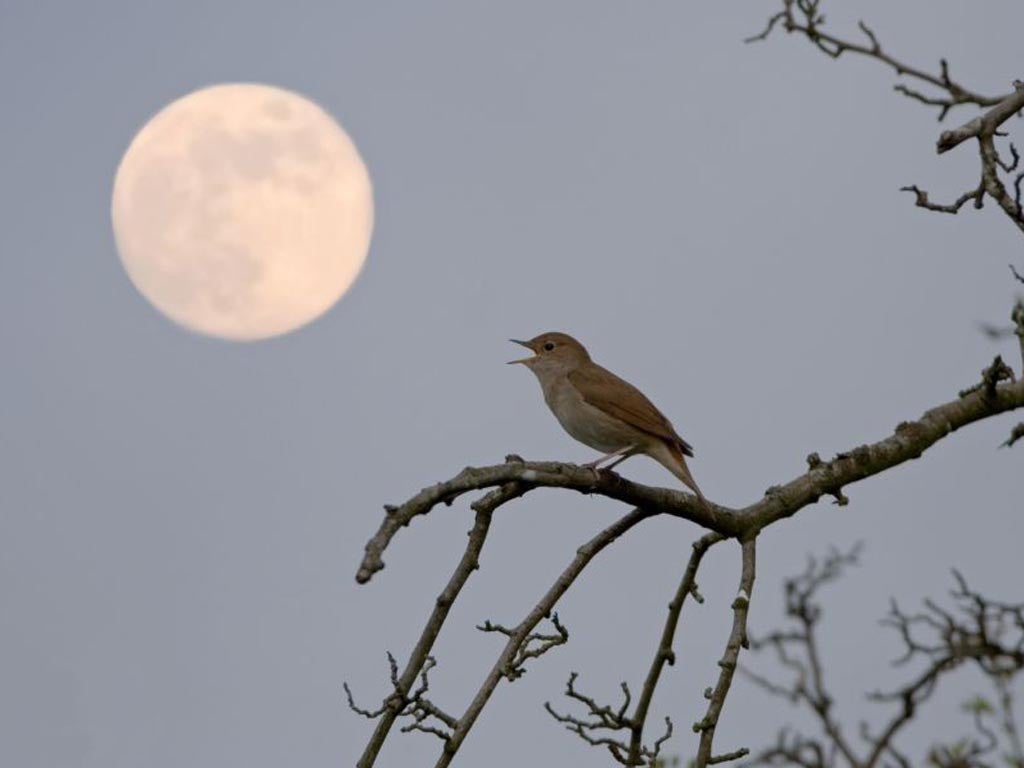Nature Studies: The decline and fall of the nightingale, poetry’s most famous bird
Experienced at night, its song is one of life’s most magical experiences

There was no moon, only the great array of the stars, with Jupiter outshining them all like a lantern hung in the dark sky; and in the stillness, the nightingale singing. It was deep in a hedge beyond a small lake, and the water surface seemed to reflect back its notes so they were not only crystal clear but startlingly loud; our small group was spellbound.
How many hear this now? Once everybody knew it, at least in southern England. This most remarkable of all birdsongs is audible in the six weeks from mid-April to early June, after the birds come back from their winter quarters in Africa; but over the years it has become less and less of an experience, and more and more just a myth.
There are two reasons for this: one, of course, is that our lives have become increasingly urbanised, for many almost wholly so, and excursions to the depths of the countryside never happen, certainly at night (though nightingales sing in the daytime too.)
The other is that the UK population of nightingales has shrunk catastrophically: in 2010 the British Trust for Ornithology revealed that numbers had decreased by 90 per cent since 1970. In other words, nine out of every 10 nightingales have fallen silent since our other celebrated songsters, the Beatles, went their separate ways.
The birds have gone from a number of counties where once they could be heard and are steadily retreating to England’s south-east corner, behind a line drawn roughly from the Wash to the Solent. Yet this is the bunch of feathers about which more poems have been written than any other – “the most versified bird in the world”. Are we concerned? Do we miss it?
Some people certainly do, such as the environmentalist Chris Rose (once deputy head of Greenpeace), who has been campaigning for the BBC to broadcast a live nightingale every spring. Last week Chris received a reply from the series editor of Springwatch promising to try.
But until they succeed, what can you do, if you’ve never heard a nightingale but sense that its song, experienced at night, may be one of life’s most magical experiences? (And I assure you it is.) Well, there is an answer: you can go on a nightingale safari.
Don’t thing Serengeti; think Sussex. You can go to the Knepp Estate near Horsham, which has become a remarkable piece of countryside: a “rewilding” project, where since 2001 agriculture has been abandoned in favour of letting the land return to its natural state, the way it may have been before Neolithic farmers began to reshape the landscape about 5000BC.
Wildlife at Knepp has exploded since the rewilding began, with turtle doves (gone from most of Britain) and purple emperor butterflies and nightingales all present in numbers; Penny Green, the resident ecologist, thinks there are 32 to 34 pairs of nightingales – about 2 per cent of the British population. And the estate runs safaris to listen to them at night (details on www.kneppsafaris.co.uk).
You’ll need to be quick, because the birds will only sing for a few more weeks at most; but you have an enthralling experience in prospect, especially in fine weather – as I found last week, for it was on a Knepp safari that we heard the bird by the lake, performing its unforgettable concert in the stillness and the starlight.

Join our commenting forum
Join thought-provoking conversations, follow other Independent readers and see their replies